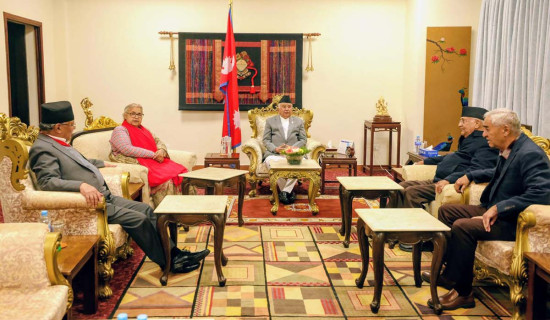- Tuesday, 23 December 2025
Promoting Occupational Safety And Health
Safe and healthy working environment is a fundamental principle and right at work. Globally, there are increasing evidences of occupational accidents and diseases which have devastating impacts on workers and their communities at large. In reality, the existing prevention efforts of accidents and work-related diseases are grossly limited in many low-income countries.
According to World Health Organisation (WHO) and International Labour Organisation (ILO), work related diseases and injuries were responsible for the deaths of 1.9 million people in 2016, The majority of work-related deaths were due to respiratory and cardiovascular disease.
More importantly, non-communicable diseases accounted for 81 per cent of the deaths. The experiences suggest that work-related diseases and injuries strain health systems, reduce productivity and can have a catastrophic impact on household incomes.
Advocacy
In many countries, there is limited or no occupational health coverage. Moreover, their access to health protection and preventive services is still limited in the formal sector with decent jobs and social protection benefits. Unfortunately, the poor workers in informal sector do not have social protection and insurance for occupational injuries. Therefore, there is a need for advocacy to work towards full coverage of all workers, particularly those in the informal sector, agriculture, small enterprises and migrant workers with essential health services for the prevention and control of work-related diseases and injuries.
In this context, providing occupational health and safety measures for protecting health workers is critical for well-functioning and resilient health systems, quality of care and maintaining a productive health workforce. Obviously, health workers face a range of occupational risks associated with biological, chemical, physical, and psychosocial hazards affecting the safety of both health workers and patients.
On the other side, health policy and strategic action plans have not sufficiently addressed the emerging needs of promoting safety and health at work. There is a clear requirement to develop evidence-based interventions for prevention of physical, chemical, biological and psycho-social hazards at work. More focus is needed to build workplace resilience to extreme weather events, air pollution, industrial disasters and disease outbreaks. However, this is easier said than done.
While looking at the world of work, there is a clear link between health, sustainable development and poverty reduction. Evidence suggests that the workers in poor communities are much more likely to be exposed to occupational hazards and to suffer work-related diseases and injuries. The resulting disabilities affect their working capacity and income. Additionally, while women and older workers might be more vulnerable, they need to be protected for their livelihoods.
Considering the recent trends of labour migration, migrant workers face a range of health risks due to their exposure to occupational and health hazards, poor working and living conditions, lack of access to essential social protection services. The language and cultural barriers as well as unhealthy diets cannot be ignored. There are also evidences of women migrant workers facing sexual harassment and exploitation at the workplace. In particular, the irregular and undocumented as well as temporary migrants, are more at health risks because they are not covered by health and social security in the countries of destination.
Concerted efforts are needed from the government in order to enhance the protection of migrant workers by engaging with employers and workers and ensure gender responsive social protection in the informal sector. One of the noteworthy consideration is the inclusion of migrant workers in social security scheme which is largely administered by Social Security Fund (SSF). In this context, Health Insurance Board (HIB) aims to enable people to access quality health care services without placing a financial burden on them. However, there are emerging needs to strengthen implementation aspects of the social health insurance at large.
From health systems perspective, the health and safety of workers have been more important during COVID-19 and other climate-related disasters or emergencies. Over the years, there are specific initiatives on COVID-19 response and recovery which largely focus on protection of health workers as well as prevention and mitigation of COVID-19 in other work settings outside the health sector. Therefore, occupational health services have an important role for protecting workers and ensuring the continuity of activities in all workplaces.
Preventive services
Apart from this, unsafe and insufficient water for drinking and washing, inadequate sanitation and hygiene, hazardous healthcare waste and climate related risks may cause work-related diseases and injuries among health workers. Likewise, global health threats such as HIV/AIDS, tuberculosis (TB), malaria and the growing burden of non-communicable diseases and poor mental health have tremendous impacts on migrant workers and their families. Their access to health protection and preventive services is still limited in the formal sector with decent jobs and social protection benefits.
Unfortunately, the poor workers in informal sector have limited or no social protection and insurance for occupational injuries. Therefore, there is a need for advocacy to work towards full coverage of all workers, particularly those in the informal sector, agriculture, small enterprises and migrant workers with essential interventions and basic health services for the prevention and control of occupational and work-related diseases and injuries.
While envisioning the ambitious goal of universal health coverage, it is equally important to provide all workers with access to people-centred health services that can respond effectively to their specific health needs and choices. These include a range of social protection services against occupational diseases and injuries to promote their overall health and social wellbeing.
(PhD in global health, Bhandari writes on health and development issues.)

















